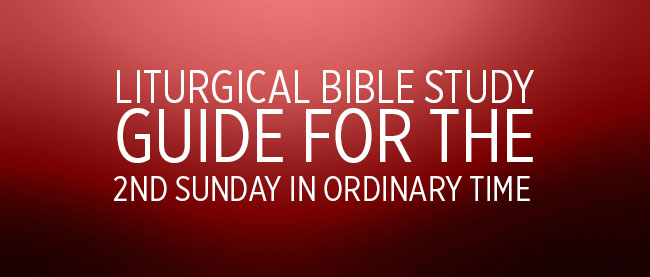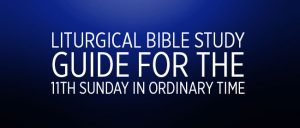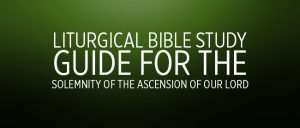1st Reading – 1 Samuel 3:3b-10, 19
The two books under Samuel’s name in the Greek version of the Old Testament, the Septuagint, correspond to one book in the Hebrew Bible where it is located among the “later prophets.” The Vulgate, following the Greek, puts 1st and 2nd Samuel and 1st and 2nd Kings under the same heading: 1st through 4th Kings. The New Vulgate separates them into 1st and 2nd Samuel and 1st and 2nd Kings.
Hebrew tradition has it that the inspired writer of 1st Samuel was the prophet Samuel himself, at least up to Chapter 25 where his death is described. The main purpose of 1st and 2nd Samuel is to provide a history of the foundation of
the kingdom of Israel and the settlement of the throne on David and his line. At the end of the book of Judges, the people saw a monarchy as the only way out of a situation of internal strife and anarchy. Outside enemies had been reduced to one – the Philistines, who were established along the Mediterranean coast; but the Philistines were so formidable and expansionist that the very survival of Israel seemed to be at stake and the tribes really needed to combine forces.
Samuel, who is regarded as the last of the judges, was the man chosen to bring about this unification. God used him to make Saul the first king of Israel. It is of Samuel’s call that we hear today.
2nd Reading – 1 Corinthians 6:13c-15a, 17-20
Today we will continue our study of 1st Corinthians; a study that began in the weeks of ordinary time between Christmas and Lent last year (Cycle A) and will be concluded during the same period in Cycle C.
The busy port of Corinth had a lively and turbulent Christian community. This first surviving letter from Saint Paul to them treats difficulties in the community reported to Paul, who was probably in Ephesus in A.D. 57, by their envoys, then answers various questions they brought to him. Finally, Paul teaches about the resurrection (we will hear this teaching during Cycle C). In dealing with these moral and practical issues, Saint Paul imparts invaluable teaching about Christ as the Wisdom of God, the Church as His Body, and the gifts of the Spirit in the Christian community. He stresses the primacy of conscience and the independent value of every Christian, for each has a particular part to play as a unique member of the body of Christ. The gifts of the Spirit, no matter how spectacular, are to be assessed only by their contribution toward building up the body of Christ.
Last year we began looking at the divisions and scandals within the Corinthian church: we looked at the factions which had formed (those who followed Apollos, Cephas, and Paul for example), incest in Corinth (chapter 5), then recourse to the Gentile courts (“If any of you has a dispute with another, dare he take it before the ungodly for judgment?”).
Today we deal with the last of the scandals addressed by Saint Paul – sexual immorality.
Gospel – John 1:35-42
In our first reading, we heard of Samuel’s call to serve God. Today, in our gospel reading, we hear of the calling of the first of Jesus’ disciples. It is only from John’s gospel that we learn that Jesus’ first disciples had originally been disciples of John the Baptist.





